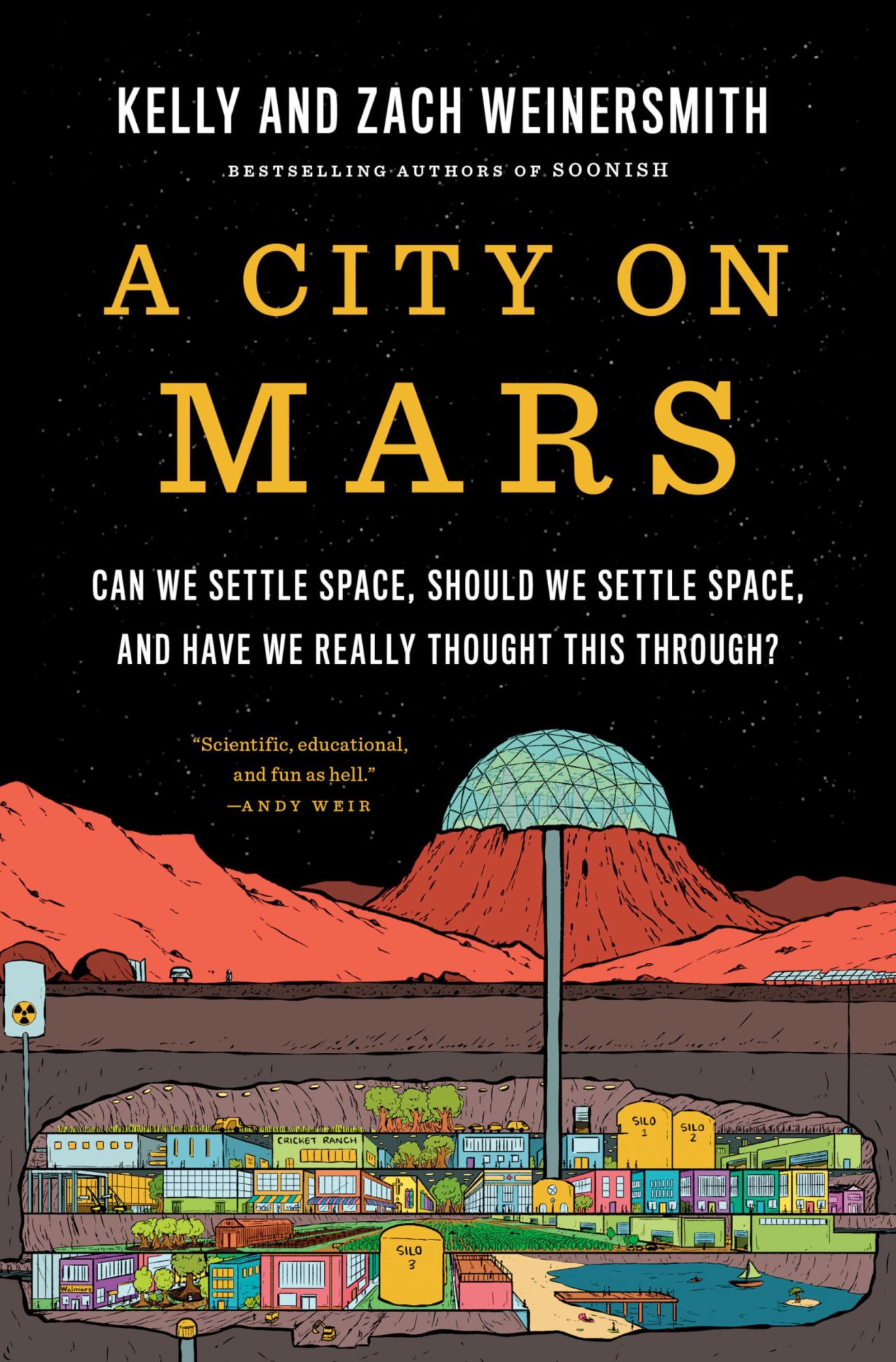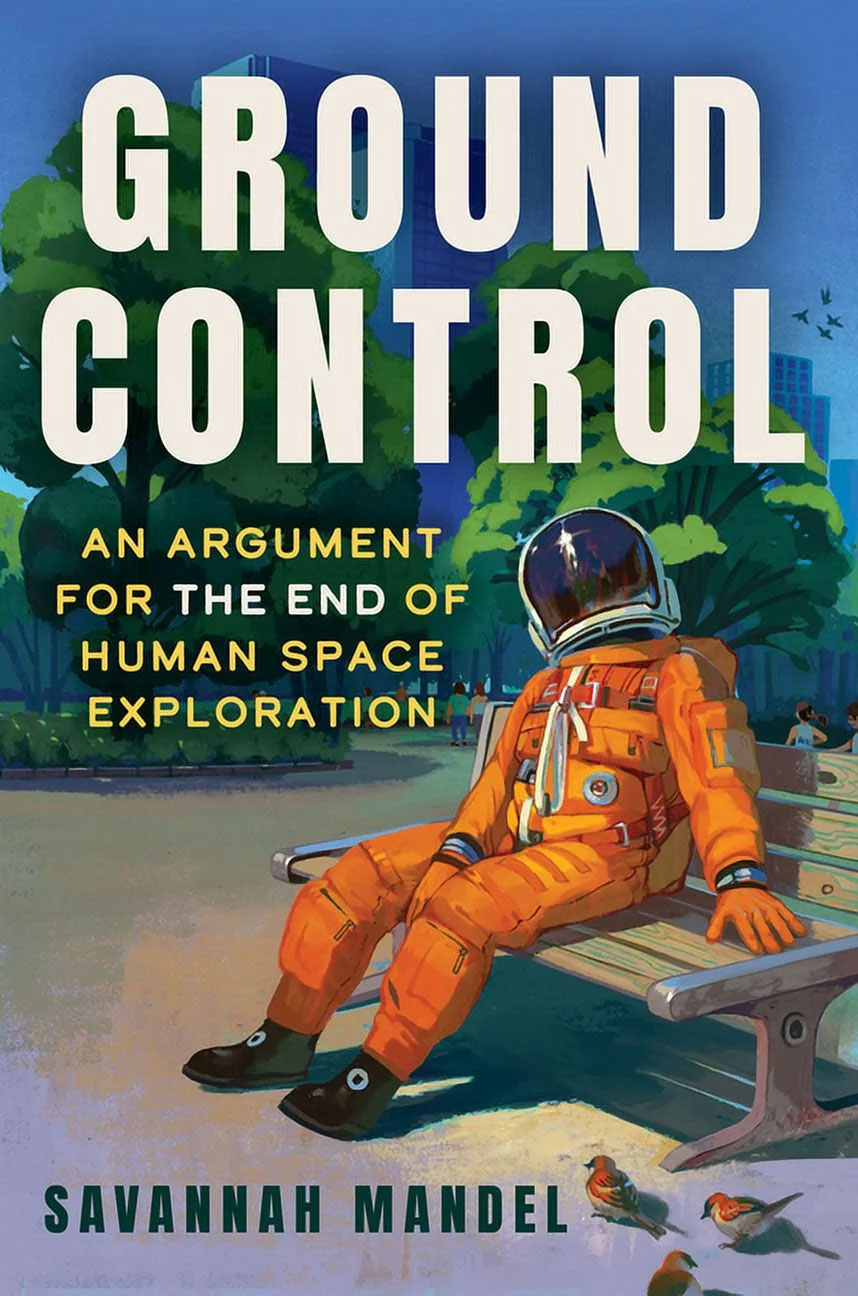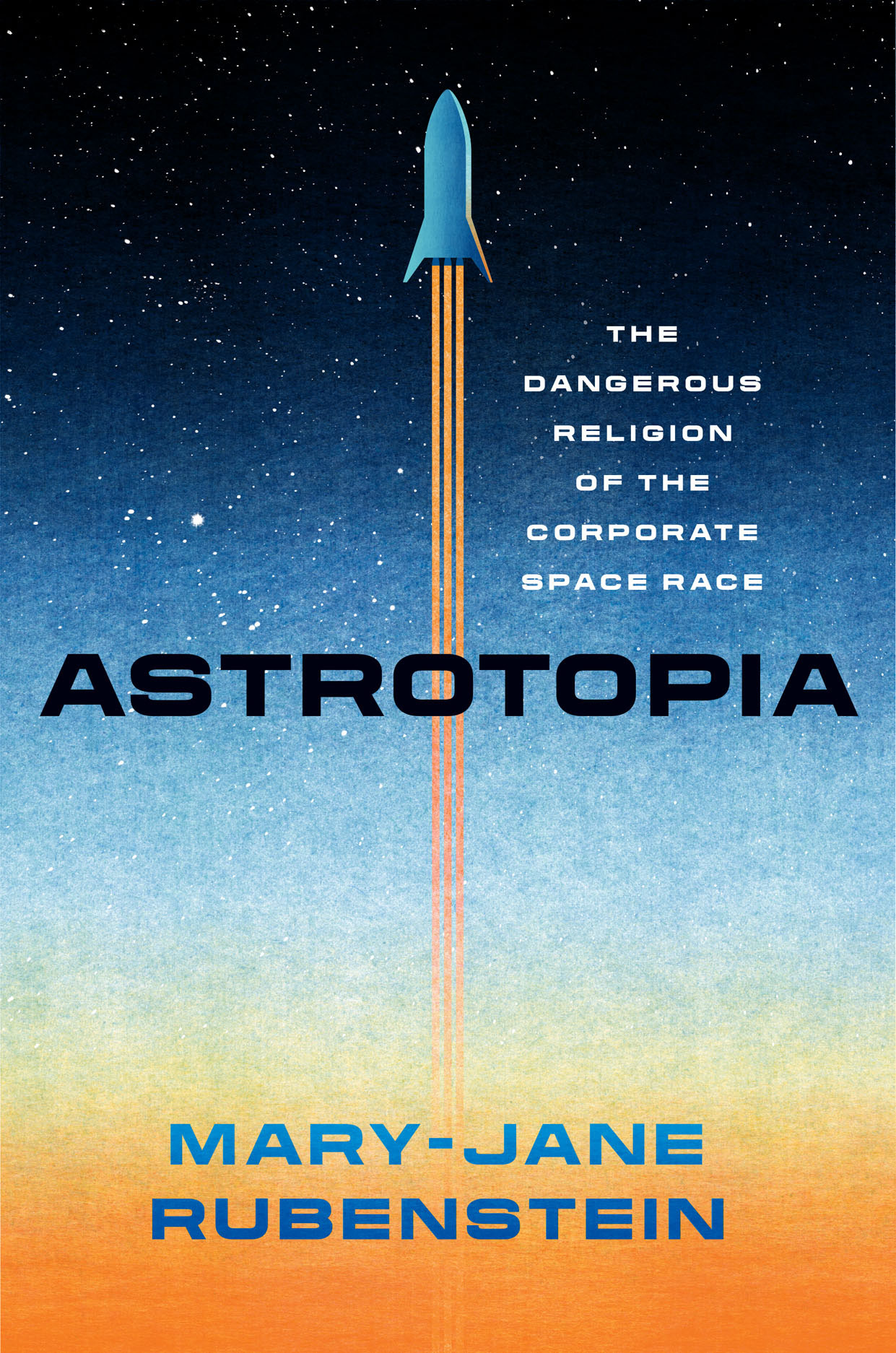Elon Musk and Jeff Bezos are bitter rivals in the commercial space race, but they agree on one thing: Settling space is an existential imperative. Space is the place. The final frontier. It is our human destiny to transcend our home world and expand our civilization to extraterrestrial vistas.
This belief has been mainstream for decades, but its rise has been positively meteoric in this new gilded age of astropreneurs. Expanding humanity beyond Earth is both our birthright and our duty to the future, they insist. Failing to do so would consign our species to certain extinction—either by our own hand, perhaps through nuclear war or climate change, or in some cosmic disaster, like a massive asteroid impact.
But as visions of giant orbital stations and Martian cities dance in our heads, a case against human space colonization has found its footing in a number of recent books. The argument grows from many grounds: Doubts about the practical feasibility of off-Earth communities. Concerns about the exorbitant costs, including who would bear them and who would profit. Realism about the harsh environment of space and the enormous tax it would exact on the human body. Suspicion of the underlying ideologies and mythologies that animate the race to settle space.
And, more bluntly, a recognition that “space sucks” and a lot of people have “underestimated the scale of suckitude,” as Kelly and Zach Weinersmith put it in their book A City on Mars: Can We Settle Space, Should We Settle Space, and Have We Really Thought This Through?, which was released in paperback earlier this year.

We Settle Space, and Have We Really Thought This Through?
Kelly and Zach Weinersmith
The Weinersmiths, a husband-wife team, spent years thinking it through—in delightfully pragmatic detail. A City on Mars provides ground truth for our lofty celestial dreams by gaming out the medical, technical, legal, ethical, and existential consequences of space settlements.
Much to the authors’ own dismay, the result is a grotesquery of possible outcomes including (but not limited to) Martian eugenics, interplanetary war, and—memorably—“space cannibalism.”
The Weinersmiths puncture the gauzy fantasy of space cities by asking pretty basic questions, like how to populate them. Astronauts experience all kinds of medical challenges in space, such as radiation exposure and bone loss, which would increase risks to both parents and babies. Nobody wants their pregnant “glow” to be a by-product of cosmic radiation.
Trying to bring forth babies in space “is going to be tricky business, not just in terms of science, but from the perspective of scientific ethics,” they write. “Adults can consent to being in experiments. Babies can’t.”
You don’t even have to contemplate going to Mars to make some version of this case. In Ground Control: An Argument for the End of Human Space Exploration, Savannah Mandel chronicles how past and present generations have regarded human spaceflight as an affront to vulnerable children right here on Earth.

Savannah Mandel
“Hungry Kids Can’t Eat Moon Rocks,” read signs at a protest outside Kennedy Space Center on the eve of the Apollo 11 launch in July 1969. Gil Scott-Heron’s 1970 poem “Whitey on the Moon” rose to become the de facto anthem of this movement, which insists, to this day, that until humans get our earthly house in order, we have no business building new ones in outer space.
Ground Control, part memoir and part manifesto, channels this lament: How can we justify the enormous cost of sending people beyond our planet when there is so much suffering here at home?
Advocates for human space exploration reject the zero-sum framing and point to the many downstream benefits of human spaceflight. Space exploration has catalyzed inventions from the CAT scan to baby formula. There is also inherent value in our shared adventure of learning about the vast cosmos.
Those upsides are real, but they are not remotely well distributed. Mandel predicts that the commercial space sector in its current form will only exacerbate inequalities on Earth, as profits from space ventures flow into the coffers of the already obscenely rich.
In her book, Mandel, a space anthropologist and scholar at Virginia Tech, describes a personal transformation from spacey dreamer to grounded critic. It began during fieldwork at Spaceport America, a commercial launch facility in New Mexico, where she began to see cracks in the dazzling future imagined by space billionaires. As her career took her from street protests in London to extravagant space industry banquets in Washington, DC, she writes, “crystal clear glasses” replaced “the rose-colored ones.”
Mandel remains enchanted by space but is skeptical that humans are the optimal trailblazers. Robots, rovers, probes, and other artificial space ambassadors could do the job for a fraction of the price and without risk to life, limb, and other corporeal vulnerabilities.
“A decentralization of self needs to occur,” she writes. “A dissolution of anthropocentrism, so to speak. And a recognition that future space explorers may not be man, even if man moves through them.”
In other words, giant leaps for mankind no longer necessitate a man’s small steps; the wheels of a rover or the rotors of a copter offer a much better bang for our buck than boots on the ground.
In contrast to the Weinersmiths, Mandel devotes little attention to the physical dangers and limitations that space imposes on humans. She is more interested in a kind of psychic sickness that drives the impulse to abandon our planet and rush into new territories.
Mary-Jane Rubenstein, a scholar of religion at Wesleyan University, presents a thorough diagnosis of this exact pathology in her 2022 book Astrotopia: The Dangerous Religion of the Corporate Space Race, which came out in paperback last year. It all begins, appropriately enough, with the book of Genesis, where God creates Earth for the dominion of man. Over the years, this biblical brain worm has offered divine justification for the brutal colonization and environmental exploitation of our planet. Now it serves as the religious rocket fuel propelling humans into the next frontier, Rubenstein argues.

Mary-Jane Rubenstein
“The intensifying ‘NewSpace race’ is as much a mythological project as it is a political, economic, or scientific one,” she writes. “It’s a mythology, in fact, that holds all these other efforts together, giving them an aura of duty, grandeur, and benevolence.”
Rubenstein makes a forceful case that malignant outgrowths of Christian ideas scaffold the dreams of space settlements championed by Musk, Bezos, and like-minded enthusiasts—even if these same people might never describe themselves as religious. If Earth is man’s dominion, space is the next logical step. Earth is just a temporary staging ground for a greater destiny; we will find our deliverance in the heavens.
“Fuck Earth,” Elon Musk said in 2014. “Who cares about Earth? If we can establish a Mars colony, we can almost certainly colonize the whole solar system.”
Jeff Bezos, for one, claims to care about Earth; that’s among his best arguments for why humans should move beyond it. If heavy industries and large civilian populations cast off into the orbital expanse, our home world can be, in his words, “zoned residential and light industry,” allowing it to recover from anthropogenic pressures.
Bezos also believes that space settlements are essential for the betterment of humanity, in part on the grounds that they will uncork our population growth. He envisions an orbital archipelago of stations, sprawled across the solar system, that could support a collective population of a trillion people. “That’s a thousand Mozarts. A thousand Einsteins,” Bezos has mused. “What a cool civilization that would be.”
It does sound cool. But it’s an easy layup for Rubenstein: This “numbers game” approach would also produce a thousand Hitlers and Stalins, she writes.
And that is the real crux of the argument against pushing hard torapidly expand human civilization into space: We will still be humans when we get there. We won’t escape our vices and frailties by leaving Earth—in fact, we may exacerbate them.
While all three books push back on the existential argument for space settlements, the Weinersmiths take the rebuttal one step further by proposing that space colonization might actually increase the risk of self-annihilation rather than neutralizing it.
“Going to space will not end war because war isn’t caused by anything that space travel is apt to change, even in the most optimistic scenarios,” they write. “Humanity going to space en masse probably won’t reduce the likelihood of war, but we should consider that it might increase the chance of war being horrific.”
The pair imagine rival space nations exchanging asteroid fire or poisoning whole biospheres. Proponents of space settlements often point to the fate of the dinosaurs as motivational grist, but what if a doomsday asteroid were deliberately flung between human cultures as a weapon? It may sound outlandish, but it’s no more speculative than a floating civilization with a thousand Mozarts. It follows the same logic of extrapolating our human future in space from our behavior on Earth in the past.
So should we just sit around and wait for our inevitable extinction? The three books have more or less the same response: What’s the rush? It is far more likely that humanity will be wiped out by our own activity in the near term than by any kind of cosmic threat. Worrying about the expansion of the sun in billions of years, as Musk has openly done, is frankly hysterical.
In the meantime, we have some growing up to do. Mandel and Rubenstein both argue that any worthy human future in space must adopt a decolonizing approach that emphasizes caretaking and stewardship of this planet and its inhabitants before we set off for others. They draw inspiration from science fiction, popular culture, and Indigenous knowledge, among other sources, to sketch out these alternative visions of an off-Earth future.
Mandel sees hope for this future in post-scarcity political theories. She cites various attempts to anticipate the needs of future generations—ideas found in the work of the social theorist Aaron Benanav, or in the values expressed by the Green New Deal, or in the fictional Ministry for the Future imagined by Kim Stanley Robinson in his 2020 novel of the same name. Whatever you think of the controversial 2025 book Abundance, by Ezra Klein and Derek Thompson, it is also appealing to the same demand for a post-scarcity road map.
To that end, Mandel envisions “the creation of a governing body that would require that techno-scientific plans, especially those with a global reach, take into consideration multigenerational impacts and multigenerational voices.”
For Rubenstein, religion is the poison, but it may also offer the cure. She sees potential in a revival of pantheism, which is the belief that all the contents of the universe—from rocks to humans to galaxies—are divine and perhaps alive on some level. She hasn’t fully converted herself to this movement, let alone become an evangelist, but she says it’s a spiritual direction that could be an effective counterweight to dominionist views of the universe.
“It doesn’t matter whether … any sort of pantheism is ‘true,’” she writes. “What matters is the way any given mythology prompts us to interact with the world we’re a part of—the world each of our actions helps to make and unmake. And frankly, some mythologies prompt us to act better than others.”
All these authors ultimately conclude that it would be great if humans lived in space—someday, if and when we’ve matured. But the three books all express concerns about efforts by commercial space companies, with the help of the US government, to bypass established space laws and norms—concerns that have been thoroughly validated in 2025.
The combustible relationship between Elon Musk and Donald Trump has raised eyebrows about cronyism—and retribution—between governments and space companies. Space is rapidly becoming weaponized. And recent events have reminded us of the immense challenges of human spaceflight. SpaceX’s next-generation Starship vehicle has suffered catastrophic failures in several test flights, while Boeing’s Starliner capsule experienced malfunctions that kept two astronauts on the International Space Station for months longer than expected. Even space tourism is developing a bad rap: In April, a star-studded all-woman crew on a Blue Origin suborbital flight was met with widespread backlash as a symbol of out-of-touch wealth and privilege.
It is at this point that we must loop back to the issue of “suckitude,” which Mandel also channels in her book through the killer opening of M.T. Anderson’s novel Feed: “We went to the moon to have fun, but the moon turned out to completely suck.”
The dreams of space settlements put forward by Musk and Bezos are insanely fun. The reality may well suck. But it’s doubtful that any degree of suckitude will slow down the commercial space race, and the authors do at times seem to be yelling into the cosmic void.
Still, the books challenge space enthusiasts of all stripes to imagine new ways of relating to space that aren’t so tactile and exploitative. Along those lines, Rubenstein shares a compelling anecdote in Astrotopia about an anthropologist who lived with an Inuit community in the early 1970s. When she told them about the Apollo moon landings, her hosts burst out in laughter.
“We didn’t know this was the first time you white people had been to the moon,” they said. “Our shamans go all the time … The issue is not whether we go to visit our relatives, but how we treat them and their homeland when we go.”
Becky Ferreira is a science reporter based in upstate New York, and author of First Contact, a book about the search for alien life, which will be published in September.






















